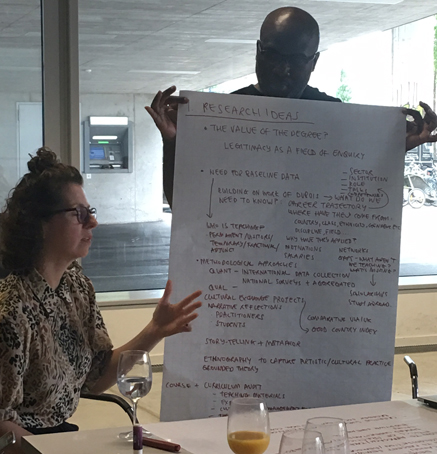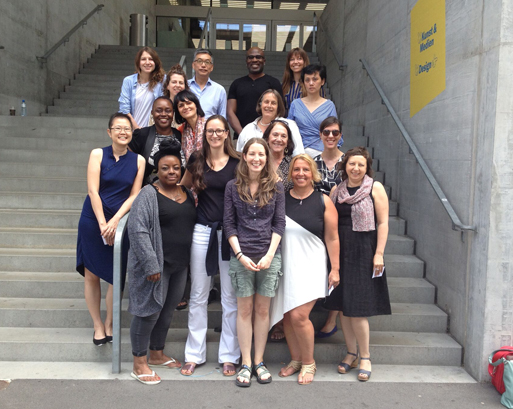2017-08-10
Authors
Antonio C. Cuyler
is Assistant Professor of Arts Administration and Coordinator of Internships at Florida State University (FSU) where he teaches Doctoral and Masters students.
Workshop report Network Brokering Intercultural Exchange
Intercultural Relations in Arts and Cultural Management Higher Education

The third seminar of the network Brokering Intercultural Exchange taking place in Zürich, Switzerland was the best gathering of Arts/Cultural Management academics, practitioners, and students I have have ever attended. To this appraisement, I have identified eight qualities that continue to come up in conversations like a leitmotiv from a Wagnerian opera.
Zürich University of the Arts made an ideal host for discussing intercultural relations. The seminars hostess, Prof. Elisabeth Danuser, was more than generous with her time. After dinner on Wednesday evening, she treated us to a roof top view of the city seen below. The co-founders of the network and organizers of the seminars Dr. Victoria Durrer from Queens University Belfast and Prof. Dr. Raphaela Henze from Heilbronn University wisely limited participation to 20 attendees. Although I am not sure how they accomplished this feat, the collection of individuals they assembled gave intellectually stimulating presentations without toxic egos that can often obstruct critical learning that should happen in these types of spaces. Brava to them! Nevertheless, to achieve this, the co-founders used a subject matter, intercultural relations, that inspired deep actionable thinking.
The seminar featured presentations on various aspects of Intercultural Relations in Higher Education. In preparation for the seminar, the co-founders encouraged attendees to prepare readings that further contextualized the presentations and discussions that ensued as a result of them. In sum, the readings, presentations, and discussions prompted attendees to intellectually engage with the topic of Intercultural Relations in Higher Education in new and meaningful ways.
The call for proposals for the seminar allowed me, too, to pilot a study on my long held research interest on the experiences of Asian international students in U. S. Arts/ Cultural Management classrooms. Although the study included a small sample of students (N=12) from China, Korea, and Thailand, the results warrant further investigation in a larger study. For example, when asked, What do you most want U. S. professors to do differently in Arts Administration classrooms? 67% of respondents answered, Provide non-U. S. examples in course content. 58% of respondents selected seek to understand international students perspectives, and 50% chose both provide examples of previously completed assignments and encourage more interaction with U. S. students. 58% of respondents reported that participating in classroom discussions is the most challenging aspect of their Arts Administration courses. Furthermore, while only 50% of respondents reported that they believed their study abroad somewhat prepared them to practice Arts Administration in their home country, 75% reported that they would give a monetary gift to support the Arts Administration program from which they earned their degree.
But even more than discussing my own research, the questions I considered as a result of the presentations are the biggest take away for me. With their presentations looking at Arts/Cultural Management education, Raphaela Henze, Lorraine Lim, and Jane Zheng inspired me to consider the question: What role should educators play in de-colonizing Arts/ Cultural Management? And, in addition, what would a de-colonized Arts/ Cultural Management curriculum look like? In my use of de-colonized here, I mean teaching a narrative of Arts/Cultural Management practice that does not promote Eurocentrism and European cultural dominance over other cultural forms from colonized parts of the world. Sociologist Karim Murjis workshop contended that higher education is a form of institutional power. It also compelled me to consider, if educators do not contribute to the de-colonization of Arts/ Cultural Management, are they willfully inflicting epistemic violence on students? Arts/ Cultural Management student Suzanne Alleynes personal perspective challenged me to think about what educators can do to counter epistemic violence with epistemic justice in Arts/ Cultural Management? And Arts/ Cultural Management practitioner Hilary Cartys presentation encouraged me to reflect on the question, what implications does a de-colonized curriculum that intentionally promotes epistemic justice have for Arts/ Cultural Management practice? Would this mean greater access, diversity, equity, and inclusion? While these questions cross empirical, philosophical, and theoretical boundaries, they should also motivate Arts/ Cultural Management educators, practitioners, and students to re-imagine and design a discipline that is less capitalistic, Eurocentric, patriarchal, and undemocratic.
Often when I attend conferences, I meet colleagues with whom I intend to network with for potential future collaborations. However, typically, I initiate e-mail conversations that vanish rather quickly. In the case of this seminar, three colleagues have initiated the continuation of discussions we started in person. The most promising outcome of the seminar is a major collaborative effort to conduct an international survey that seeks to collect critical data about Arts/ Cultural Management students career trajectories (post-graduation roles, institutions, & salaries), motivations, study abroad impacts, experiences as international students, and demographics. This study has great potential to produce useful data that will inform Arts/Cultural Managements capacity and development as a discipline.
WORKSHOP IMPRESSIONS



There are no comments for this content yet.
similar content

